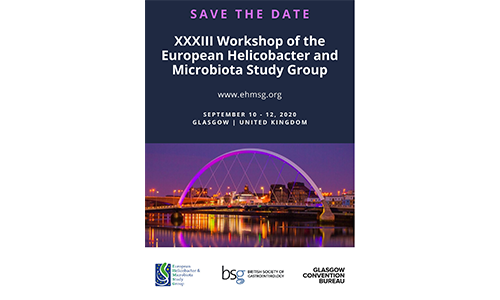2023-09 | Antwerp, Belgium – Annual Workshop
2022-09-08 | Glasgow, UK – Annual Workshop
2021-09-16 | Belgrade, Serbia – Annual Workshop
2021-06-30 | Helsingør, Denmark – International Workshop on Pathogenesis and Host Response in Helicobacter Infections
2020-09-12 – Annual Workshop
2020-07-01 | Helsingør, Denmark – International Workshop on Pathogenesis and Host Response in Helicobacter Infections
2019-09-05 | Innsbruck, Austria – Annual Workshop
2018-09-14 | Kaunas, Lithuania – Annual Workshop
2018-07-04 | Helsingør, Denmark – International Workshop on Pathogenesis and Host Response in Helicobacter Infections
2017-09-07 | Bordeaux, France – Annual Workshop
2016-09-15 | Magdeburg, Germany – Annual Workshop
2016-06-29 | Helsingør, Denmark – International Workshop on Pathogenesis and Host Response in Helicobacter Infections
2015-09-24 | Nicosia, Cyprus – Helicobacter and gut microbiota
2014-09-10 | Rome, Italy – Annual Workshop
2014-07-02 | Helsingør, Denmark – International Workshop on Pathogenesis and Host Response in Helicobacter Infections
2013-09-12 | Madrid, Spain – Annual Workshop
2012-09-13 | Ljubljana, Slovenia – Annual Workshop
2012-07-04 | Helsingør, Denmark – International Workshop on Pathogenesis and Host Response in Helicobacter Infections
2011-09-12 | Dublin, Ireland – Annual workshop
2010-07-07 | Helsingør, Denmark – International Workshop on Pathogenesis and Host Response in Helicobacter Infections / Meeting
2010 | Rotterdam, Netherlands – Annual workshop / Annual Meeting
2009-09-17 | Porto, Portugal – Annual workshop / Annual Meeting
2008-09-18 | Riga, Latvia – Annual workshop / Annual Meeting
2008-07-02 | Helsingør, Denmark – International Workshop on Pathogenesis and Host Response in Helicobacter Infections / Meeting
2007-09-20 | Istanbul, Turkey – Annual workshop / Annual Meeting
2006-09-07 | Wroclaw, Poland – Annual workshop / Annual Meeting
2006-07-01 | Helsingør, Denmark – International workshop on pathogenesis and host response in helicobacter infections / Meeting
2005-10-13 | Copenhagen, Denmark – Annual workshop / Annual Meeting
2004-09-22 | Vienna, Austria – Gastrointestinal pathology and helicobacter
2004-06-23 | Helsingør, Denmark – International workshop on pathogenesis and host response in helicobacter infections / Meeting
2003-09-03 | Stockholm, Sweden – Annual workshop
2002-09 | Athens, Greece – Annual workshop
2002-07-04 | Helsingør, Denmark – International workshop on pathogenesis and host response in helicobacter infections
2001-09-06 | Strasbourg, France – Annual workshop
2000-10-11 | Rome, Italy – Annual Workshop
1999-09-01 | Helsinki, Finland – Annual workshop
1998-09-02 | Budapest, Hungary – Annual workshop
1998-07-01 | Helsingør, Denmark – International workshop on pathogenesis and host response in helicobacter infections
1997-09-12 | Lisbon, Portugal – Annual workshop
1996-10-17 | Copenhagen, Denmark – Annual workshop
1995-07-07 | Edinburgh, UK – Annual workshop
1994 | Houston, TX USA – Annual workshop
1993-09-21 | Brussels, Belgium – Annual workshop
1992 | Dublin, Ireland – Annual workshop
1991 | Bologna, Italy – Annual workshop
1990 | Toledo, Spain – Annual workshop
1989 | Ulm, Germany – Annual Workshop
1988 | Bordeaux, France – Annual Workshop






